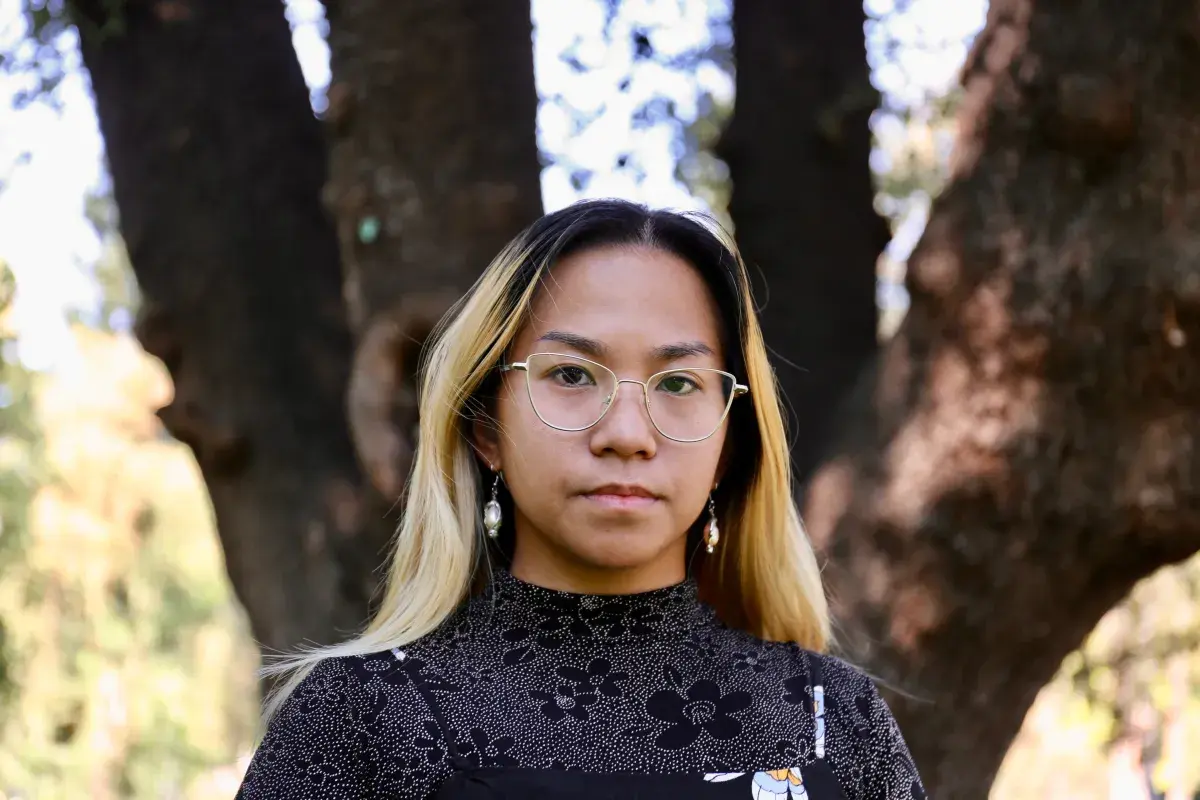Julie Bernadeth Crumb on using art as placemaking for culture
Julie Bernadeth Crumb proudly comes from a family of fishermen and small business owners. Born in the Philippines and raised in the small coastal town of Pagadian City, she came to the U.S. with her mother in 2008. Now years later, her upbringing and love of her culture informs much of her work as an interdisciplinary artist.

“I choose to represent my identity through a multidisciplinary practice because I believe that the Filipino identity is complex, and there’s so many different … personal identities within the Filipino diaspora,” she says. “I think that multidisciplinary practice is kind of like a metaphor for that.”
After coming to the U.S. at age 10, Bernadeth Crumb fostered a drive she says has always been there: to create. Through a variety of art classes and networking with arts professors at Sacramento City College and later Sacramento State, Bernadeth Crumb ultimately decided on a studio focused major and graduated with a bachelor’s in December 2023.
“I learned things like printmaking and the rudimentary skills required for digital art, and all of these things just interested me. I didn’t want to choose a specific practice,” she says. “And I really think that when you’re making art, the process that you choose needs to have meaning as well. … It feeds into this curiosity and this joy and intuitive process that I don’t think you should stifle.”
While she dabbles in photography, specifically Polaroid film, and other mediums, Bernadeth Crumb primarily works with ceramics and printmaking. She recently showcased some of her work in two Bay Area exhibitions, “Refractions” at East Bay Photo Collective and “Inheritance” at Bituin Studio.
The studio, which is located in San Francisco’s SOMA Pilipinas district, holds a special place in Bernadeth Crumb’s personal journey. As a queer artist, she says being involved with Bituin’s exhibition was “healing to be in that space and feel accepted and wanted in that space” with the queer Filipino community. Her work also centers on unlearning the systems of thought that came from her Catholic upbringing.
“I’m driven to, first and foremost, represent my people, because I still don’t see a lot of Pinays in art spaces,” she says, adding that there are few opportunities for showcasing art, particularly art that intersects with cultural identity. “It’s an act of placemaking for my people.”
Locally, Bernadeth Crumb was also part of the “Agimat” group exhibit honoring Filipino American History Month at the James Kaneko Gallery at American River College in October.
Along with recently completing a residency at E Street Gallery in Sacramento, Bernadeth Crumb is also the project coordinator for Art Tonic, which offers, among other things, grant writing services, writing workshops and professional development opportunities for artists and creatives in the Sacramento region.
On what’s ahead, Bernadeth Crumb plans to continue using her art to advocate for representation.
“Artists create to put meaning into the world and to reflect on the things in our world that affect them and their community,” she says. “[A] very important part of my work and where it’s going to go in the future is what role it plays in spaces related to activism and cultural representation, because I think those two things are very intertwined.”
After coming to the U.S. at age 10, Bernadeth Crumb fostered a drive she says has always been there: to create. Through a variety of art classes and networking with arts professors at Sacramento City College and later Sacramento State, Bernadeth Crumb ultimately decided on a studio focused major and graduated with a bachelor’s in December 2023.
“I learned things like printmaking and the rudimentary skills required for digital art, and all of these things just interested me. I didn’t want to choose a specific practice,” she says. “And I really think that when you’re making art, the process that you choose needs to have meaning as well. … It feeds into this curiosity and this joy and intuitive process that I don’t think you should stifle.”
While she dabbles in photography, specifically Polaroid film, and other mediums, Bernadeth Crumb primarily works with ceramics and printmaking. She recently showcased some of her work in two Bay Area exhibitions, “Refractions” at East Bay Photo Collective and “Inheritance” at Bituin Studio.
The studio, which is located in San Francisco’s SOMA Pilipinas district, holds a special place in Bernadeth Crumb’s personal journey. As a queer artist, she says being involved with Bituin’s exhibition was “healing to be in that space and feel accepted and wanted in that space” with the queer Filipino community. Her work also centers on unlearning the systems of thought that came from her Catholic upbringing.
“I’m driven to, first and foremost, represent my people, because I still don’t see a lot of Pinays in art spaces,” she says, adding that there are few opportunities for showcasing art, particularly art that intersects with cultural identity. “It’s an act of placemaking for my people.”
Locally, Bernadeth Crumb was also part of the “Agimat” group exhibit honoring Filipino American History Month at the James Kaneko Gallery at American River College in October.
Along with recently completing a residency at E Street Gallery in Sacramento, Bernadeth Crumb is also the project coordinator for Art Tonic, which offers, among other things, grant writing services, writing workshops and professional development opportunities for artists and creatives in the Sacramento region.
On what’s ahead, Bernadeth Crumb plans to continue using her art to advocate for representation.
“Artists create to put meaning into the world and to reflect on the things in our world that affect them and their community,” she says. “[A] very important part of my work and where it’s going to go in the future is what role it plays in spaces related to activism and cultural representation, because I think those two things are very intertwined.”





